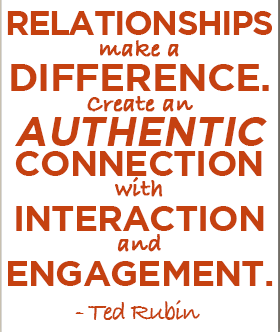For me Twitter and new friends have gone hand-in-hand from the beginning. And I’m not just talking about gaining followers here—I’m talking about true connection, forming relationships and making things happen. I’ve never “bought” a single Twitter follower for any of my profiles, yet I’ve amassed over 700,000 followers to date (and I’ve been active since Q4 2008). How did I do it? By making a conscious effort to connect, converse, and add value always with an eye to building relationships.
conversation
Wanted… Sensitivity Training on Social Channels ~via @InsideCXM
We’ve all seen cringe-worthy moments on social, when someone says the exact wrong thing and doesn’t even realize what they’ve done. It happens in debates over hot-button issues, comment threads on brand pages and everywhere in between. Even well-meaning comments can be hurtful when context is ignored.
@ is the Universal Sign of Engagement
 For decades, companies were very good at pushing messages into markets and talking at people rather than with them. Now companies are embracing the idea of two-way interaction. Monitoring conversations is becoming standard procedure as small and enterprise businesses alike make substantial investments in tools such as Radian6, Sprial16 and Brandtology. And, not only are companies monitoring conversations, they’re adopting social media management systems (SMMS) such as Seesmic and CoTweet to operationalize conversations and platforms such as Objective Marketer, PeopleBrowsr and Buddy Media to automate engagement campaigns.
For decades, companies were very good at pushing messages into markets and talking at people rather than with them. Now companies are embracing the idea of two-way interaction. Monitoring conversations is becoming standard procedure as small and enterprise businesses alike make substantial investments in tools such as Radian6, Sprial16 and Brandtology. And, not only are companies monitoring conversations, they’re adopting social media management systems (SMMS) such as Seesmic and CoTweet to operationalize conversations and platforms such as Objective Marketer, PeopleBrowsr and Buddy Media to automate engagement campaigns.
There’s a difference between monitoring and listening and there’s certainly a difference between conversations and engagement. How social media is employed today promotes monitoring as a reporting function and conversations as a symptom of reaction. In many ways, the state of social media is eerily reminiscent of traditional marketing. We’re fooled into a sense of collaboration and co-creation because people can respond. But programs are not measured by functionality, they are valued by the value customers take away from the experience. It begs the question, is social media in actuality anti-social?
New media philosophies, while rich with good intentions, are confined by the culture of the organization they’re designed to help. Corporate culture is pervasive and planted. It is not anything that will change suddenly because of the popularity of Twitter and Facebook no matter how strong your case. Culture shock takes place because a business is subjected to the harsh reality that customers no longer support the way business is conducted.
There’s Hearing, Then There’s Listening
 We were all probably taught the difference between listening and hearing when we were children. “I hear you,” you say. No doubt you’ve uttered that or had it uttered to you. But is it enough?
We were all probably taught the difference between listening and hearing when we were children. “I hear you,” you say. No doubt you’ve uttered that or had it uttered to you. But is it enough?
We all have a fundamental need to be heard; that implies that we’re acknowledged, certainly. Technically, hearing is simply the process of sound being transmitted and received. Telling someone that you’ve heard them is a good first step, and while that’s an easy way to make a customer feel appreciated by a major brand, there are times when it needs to go beyond hearing and to truly listen: to take to heart what they’ve said and take a harder look at a business practice or service.
The Truth About Social Media ROI (and why Facebook isn’t enough to deliver)
I recently found myself in a heated debate on Twitter about the ROI of social media. In one corner sat those promoting ‘there is no return on social media…yet’ and in the other sat myself insisting ‘it’s not only possible, it’s happening.’
The skeptical side of me wondered if those who are promoting the ‘no ROI from social’ stance are those who are truly generating ‘no ROI from social’ and are perhaps looking to substantiate that result. But then again, maybe I was wrong. After all, there were some pretty smart people in that opposite corner publishing blogs on Huffington Post and ClickZ – all reaffirming the belief that Social ROI does not exist.
But after further consideration and more research, I’m sticking to my guns. Social media ROI is not only attainable, it should be expected. The harsh reality is that most business executives measure value in terms of financial metrics – not fans. While it’s true that the long-term benefits from real engagement through social media will likely be far greater than any of us realize today, it’s also true that many companies are positioned to start delivering financial returns now, particularly strong CPG brands.
The game will change in 2011
For most CPG companies today, ‘we need a social media presence’ means Facebook and Twitter. Although deeply simplified, this strategy plays out a lot like this:
- How many fans do we have? Hooray!
- How many are following us? Hooray!
- How many times is our brand mentioned on the social web? Hooray!
By all accounts, the results exceed expectations. But while you’re patting yourself on the back for attracting a social following, understand there’s someone within the company scratching their head and asking: So what? How is this investment bringing me any value?
Listening- a powerful communications tool
It has become very clear to me that listening is a more powerful communication tool than that of speaking (online or offline). I guess that is why we hear the expression we have “two ears and only one mouth” for a reason.
Think about it.
All human beings have the desire and need to “truly be heard”. In addition, human beings seek to be understood, appreciated and connected to others. Many painful times in our lives have come about because we said something we did not mean OR do not say something we should have said. Such situations often cause pain to both us and others. No good!
Does this apply to new communication mediums such as Social Media? You bet it does. In such new arenas- listening is more important than ever.
Missed opportunities for communications growth occur when we fail to further develop a relationship because we do not get to know a person better. In other words, we have “talked” to them a lot but have learned little about them– as we have instead focused on our needs, wants and desires.
The people I enjoy the most, in all parts of life, are those who are the best listeners. Why?
The reason is simple– these people make me feel important. Don’t we all want to feel that way? Don’t we all, whether offline OR online, TRULY want have a meaningful conversation?
Our goal should be to consistently improve our listening skills. And, remember “hearing and listening” are two very different things. Such strong listening skills– will not only make you a better person– but also a better communicator, marketer and leader in all endeavors- online or offline.
What do you think?
Ryan Sauers
Why I Don’t Want Traffic
Having worked in the digital world for more than 14 years now, I’ve seen lots of trends come and go–does anyone remember “push marketing”? But during that time, Web traffic has been the constant metric for measuring success…until now.
I’ve come to realize that I really don’t care about Web site traffic. Site visits are overrated.
In fact, for my next program, if I get zero visitors to McDonalds.com, I’m ok with that. I don’t want traffic, I want conversations…and conversations don’t happen on my Web site. They happen on millions of blogs, twitter pages and forums spread throughout the Web.
We are relaunching McDonalds.com right now. The new site is gorgeous and features tons of great information about our company and our menu items. We’ve also made sure that the content is easily shareable. But like a lot of brands, we aren’t trying to stoke conversation on our brand site. Those rich conversations are happening elsewhere and it wouldn’t be an efficient use of our resources to try to move them to a branded environment where we would be legally obligated monitoring and moderating, and thus stilting, those discussions.
Think about it this way. When you build a Web site, you need to drive people to it. It would be silly to think that people will just “show up” (insert tired 1990’s quote from Field of Dreams here). Getting people’s attention in terms of awareness and clicks takes a lot of time and money. For certain types of campaigns traffic should be the number one metric, but for most of mine it won’t.
But my job is to make people aware of the high quality of our ingredients and the great balance in our menu. I want folks talking about our yummy salads and the 600 calorie Happy Meal and the most effective way to do that is by talking with people and having them talk with others in return. My key metrics will be the number of posts, and tweets that are generated. The number of comments/replies will be very important. The tone and sentiment of the conversations will also be critical.
It is a simple view of the Conversation Economy where traffic doesn’t count.
Junto is Born!
Many of us have been inspired by the cooperation meme lately, and it appears that our collective spirit has given birth to Junto!
In case you haven’t been following along, Junto is a concept we’ve been discussing for a global communications and collaboration platform. It starts with a simple interface, combining video chat with a text box and a twitter backchannel, all streaming in public, real-time. It could be used for any number of projects or goals – organizations could use it for open innovation or to show how they are taking social responsibility in the world, groups with similar initiatives could use it for huge group discussions and meetings in order to accelerate the process of organizing and taking projects from idea to action, and individuals could use it to engage in dialogue and create shared meaning and shared understanding across geographic and cultural barriers. For more context, check out the original post here.
Conversations, Relationships & Renaming Social Media
There are, no doubt, a few good reasons for some business endeavors — in particular, professional service enterprises — to have concerns over the use of social media. For example, lawyers, doctors and accountants cannot be perceived to be offering legal, medical or tax advice in any media marketing context — social or otherwise.
I believe every concern I’ve heard can be addressed; but I’ll also cop to believing the benefits of conversations with clients and targets far outweigh concerns — provided, of course, ethical and regulatory issues are appropriately addressed.

